Nearly a game of two halves: 5 lessons from Arsenal 3-1 Sunderland
Sam Allardyce has annoyed Arsene Wenger before, but his Sunderland side couldn’t hold out forever against Arsenal. John Robertson was in the Emirates pressbox using Stats Zone - FREE on iOS and Android...
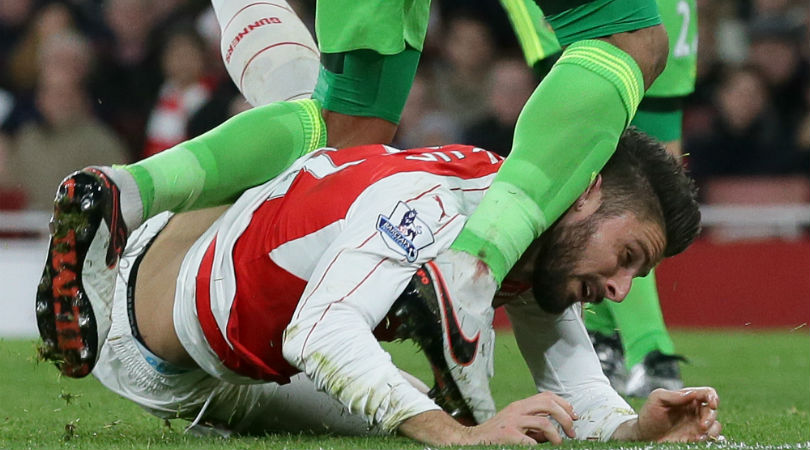
1. Arsenal are the footballing Jekyll and Hyde
It’s a game of two halves… a cliché you will have heard numerous times, even if your experience of football began only this weekend. Whilst you can’t precisely apply the sentiment to Arsenal’s performance this afternoon against Sunderland, you can get pretty darn close.
For 55 minutes, save for the slick move that led to Joel Campbell’s strike to open the scoring just after the half-hour mark, Arsenal were ponderous. Sunderland’s hustle in midfield when without possession, coupled with how little space Sam Allardyce’s three-man central defence offered, worked to almost completely nullify any attempts Arsenal made to play the ball into Olivier Giroud whenever the Frenchman worked his way into the box.
Then, for the final 35 minutes, things changed. Arsene Wenger clearly instructed Alex Oxlade-Chamberlain and Campbell to stay wider during the attacking phase, the extra width bypassing Sunderland’s clear attempts to suffocate Aaron Ramsey and Mesut Ozil through the middle and opening the door for a more diverse and unpredictable approach to the creation of chances.
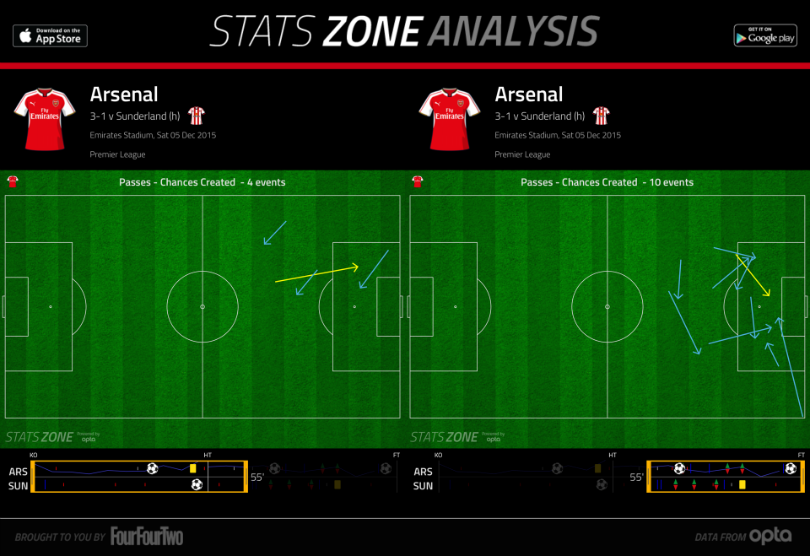
Due to the added width, passes were able to go sideways rather than backwards when moves broke down – halting the forward march, but retaining possession in areas of the pitch that kept the pressure on Sunderland.
This allowed more passes to eventually connect with players that had got themselves into dangerous positions and, crucially, rid themselves of attempting the low-percentage passes, often straight through multiple defenders, that characterised much of their attacking build-up for the first hour – exactly what Allardyce would have wanted to see.
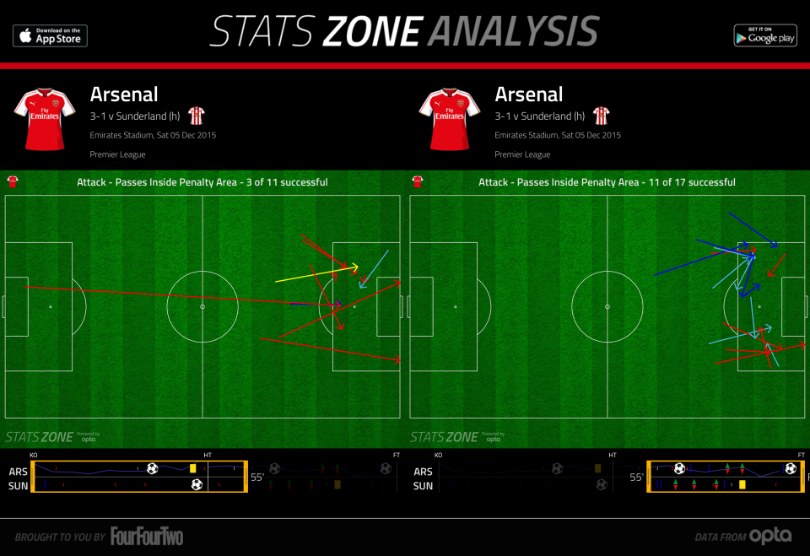
2. Sunderland no longer look like relegation candidates
Get FourFourTwo Newsletter
The best features, fun and footballing quizzes, straight to your inbox every week.
They might be languishing very close to the bottom of the table, and they might have lost today, but Sunderland have come a very long way in a short amount of time under Allardyce’s tutorage. If they can play with this level of cohesion and enthusiasm every week, they will, for the first time in a long time, find themselves clear of their annual end-of-season race against relegation.
Counter-attacking was the name of the game for them today. It’s a gameplan that is hardly original or beautiful to watch, but the precision with which it was executed must be respected.
Barely a tackle was attempted in the Arsenal half, nor was an interception. As soon as they lost the ball it was all hands on deck to create two defensive lines – one of four in the midfield, another of five at the back – and win possession only when Arsenal had come deep enough to leave themselves open to a long ball into Fabio Borini.
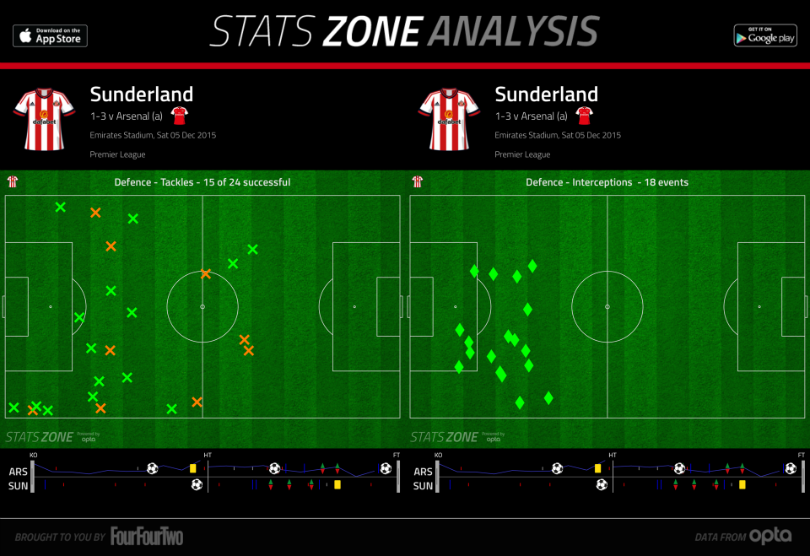
The most impressive element of the approach wasn’t the discipline shown by the players in employing it, it was the precision they showed in retrieving the ball in exactly the right zones.
Arsenal were allowed to push high enough to leave themselves vulnerable, but not high enough to make clean passes into the box. However, once Sunderland had conceded the second goal, a typically artistic string of passes finished with class by Giroud, they were forced to abandon the defensive mindset and start playing higher up the pitch – allowing Arsenal to capitalise on the tactical alterations they made in the second half, as described above.
3. Campbell is effective because he’s different
Amidst the sniper-like precision that Wenger looks to promote within his team is a bull-in-a-china-shop named Joel Campbell.
Where his allies around him are seeking the perfect pass, the most glamorous angles and the facilitation of the simplest of tap-ins, Campbell is huffing and puffing with everything he can muster – flying into tackles, looking to shoot from awkward positions and relying on his speed and determination to drain his opponents of confidence. It’s hardly graceful, but it can yield results… even if you’ve got no idea what those results might be before he steps onto the field.
It was little surprise, then, that Campbell’s sheer exuberance provided the goal against a Sunderland that was concentrating on suffocating Arsenal’s predictably sophisticated approach in the first half. Allardyce set his team up to stop one thing, but Campbell became that trump card that is difficult to see coming.

What’s interesting, though, is Campbell’s ability to channel that oomph into something resembling a structure. Looking at his ‘passes received’ data shows a player that was seemingly covering the entire pitch, but that wasn’t the case.
Campbell started on the right side, but moved over the left as the first half went on. Whether on the right or left he stuck to his position diligently, using every ounce of energy in doing so. Once the game had move beyond its ‘feeling out’ phase, he also did his best to cover defensively on the left side where he spent most of his time.
He’s a player very unlike those that Arsenal have tended to field over the Wenger years, then, but that doesn’t mean he’s unable to work within his manager’s structure.
4. Ozil not as consistent without Cazorla
Ozil shined in the moments that later revealed themselves to be key to victory, but the German hadn’t always had it his own way. For long periods of the game he was kept quiet, experiencing plenty of possession but not always able to advantage of it.
In large part this was due to Sunderland’s positioning in the middle of the park, but a lack of assistance in the attacking third was also to blame. Ozil and Santi Cazorla have combined for more passes this season than any other Premier League pairing, and without the Spaniard’s desire to break forward there sometimes existed what looked like a lack of ideas.
This afternoon it was Ramsey who received more passes from Ozil than anyone else, although the vast majority of those went backwards. Indeed, when Ozil did attempt forward passes many of them went astray – in part thanks to the absence of Cazorla and the runs that he makes that force defenders to move to cover him, creating passing lanes in the process.
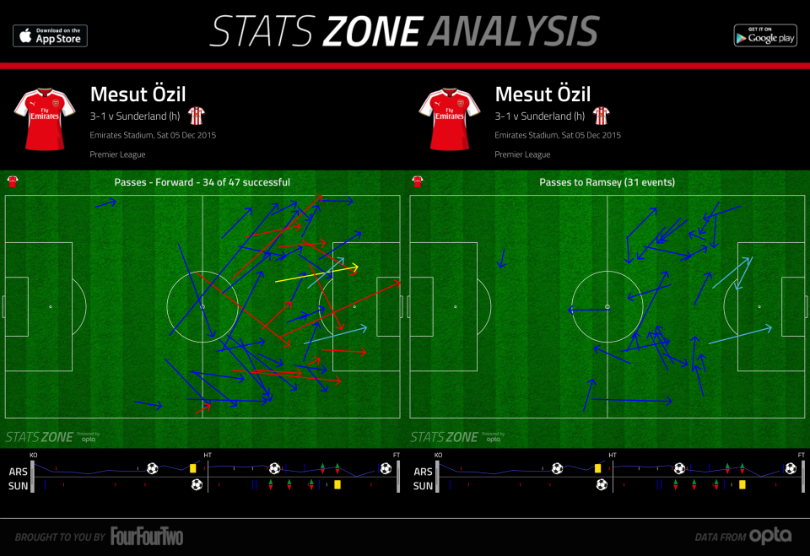
However, it can’t be said that Ozil failed to make the most of opportunities when they did come. As the game wore on Ramsey took it upon himself to get forward more often, which buoyed Ozil’s success rate with forward passes and awarded him a stats line that singled him out as the game’s best performer.
Against elite competition, though, the Ozil/Cazorla partnership will be sorely missed.
5. Giroud needs a lot of assistance to make an impact
Give Giroud a decent chance in front of goal and he’ll take it. Ask Giroud to make a chance for himself and he struggles.
As discussed, Sunderland’s defence made it incredibly difficult for Arsenal to get the ball into Giroud’s feet, but part of the problem was the striker’s reluctance (or inability) to position himself within those narrow channels that did exist. He might need only one chance to score, but his teammates need more than one chance to find him.
By the time he was substituted after 80 minutes he had mustered two attempts on goal, one of those from a set-piece. Further, when he received possession outside of the box he often wasted it, his attempts to engage in a similar form of delicate passing to that offered by his teammates typically falling flat.
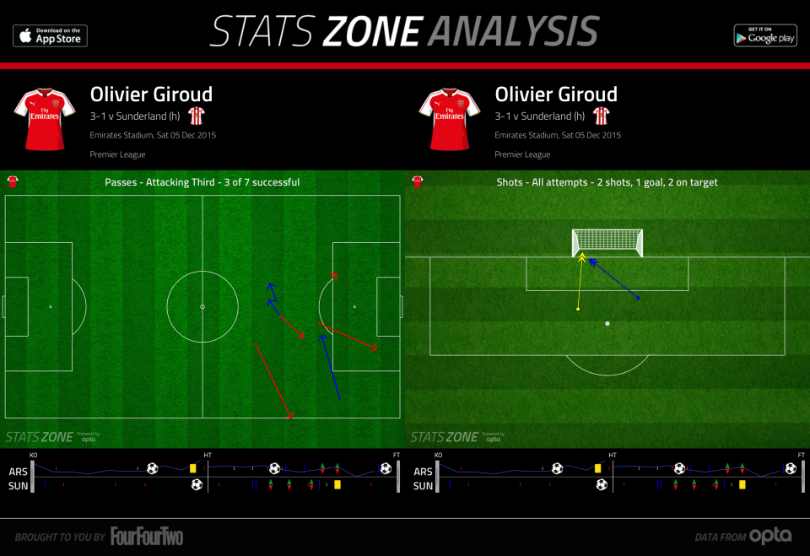
He’s a natural finisher, but he doesn’t often show the kind of flexibility and footballing intelligence required to perform multiple tasks on the pitch. Within Wenger’s structure, and within modern, top-tier football in general, a player that can do only one job tends to struggle in the long term. Giroud scores enough goals thanks to the abilities of those around him, but questions remain as to how well he’d fare without so many others holding his hand.
Match facts
- Mesut Ozil has had a hand in 14 goals in his last 13 Premier League appearances (2 goals, 12 assists).
- Ozil has now recorded 12 Premier League assists this season, the most by an Arsenal player since Cesc Fabregas in 2009/10 (13).
- Arsenal have conceded a league-high 3 own-goals in the Premier League this season.
- The Gunners have now gone 4 top-flight games without keeping a clean sheet, their longest run since December 2014-January 2015 (6 games in total).
- Olivier Giroud has had a hand in six goals in his last four Premier League appearances against Sunderland (four goals, two assists).
- Since joining Arsenal in the summer of 2012, Giroud has netted 17 headed goals in the Premier League, more than any other player.
- Arsenal are unbeaten in their last 12 top-flight clashes with Sunderland (W8 D4) and have suffered defeat in just 1 of the last 24 against the Black Cats.
- Sam Allardyce has now lost 8 successive Premier League games against the Gunners and hasn’t beaten the north Londoners in the competition since May 2010 (Blackburn 2-1 Arsenal).
Analyse Arsenal 3-1 Sunderland yourself with Stats Zone
More features every day on FFT.com • More analysis
STATS ZONE Free on iOS • Free on Android
